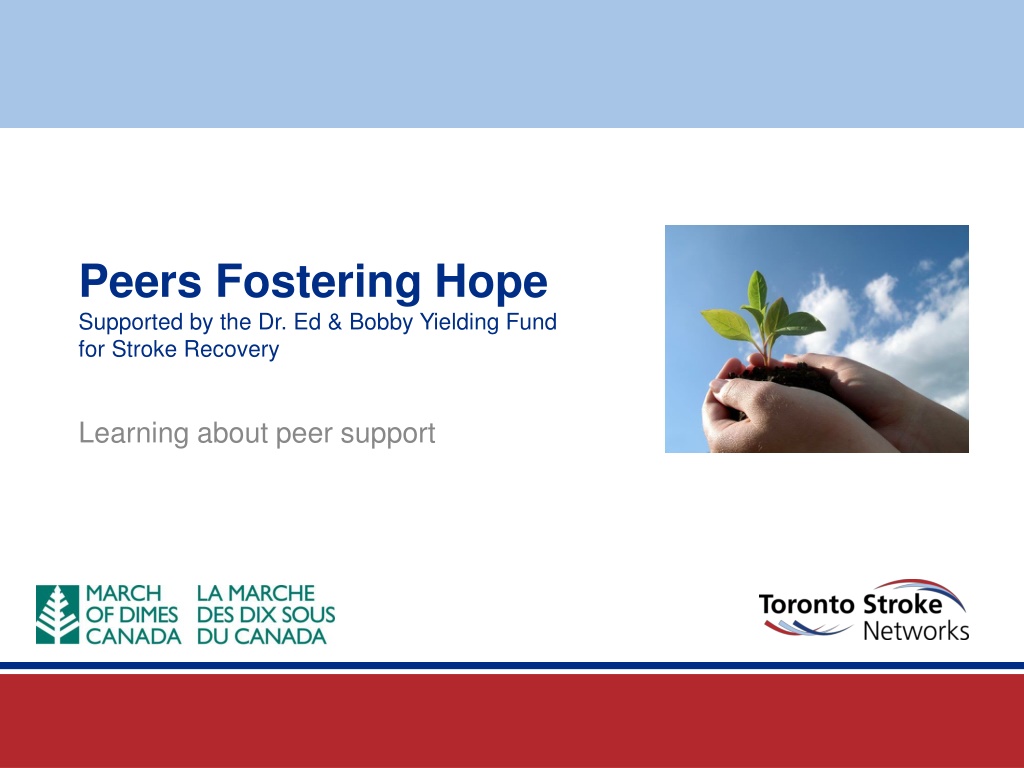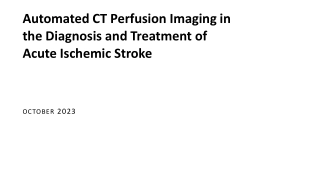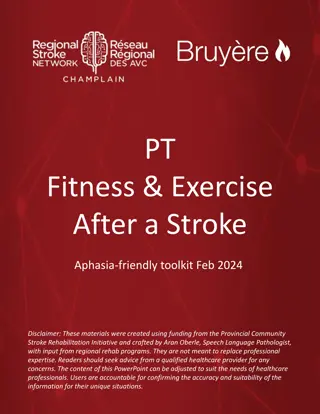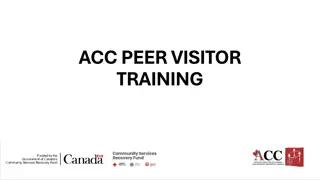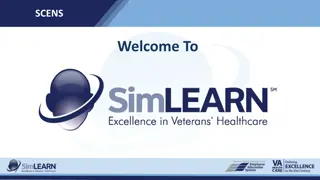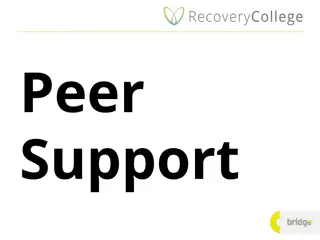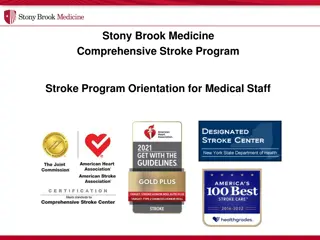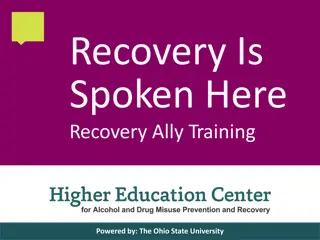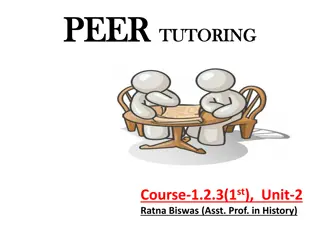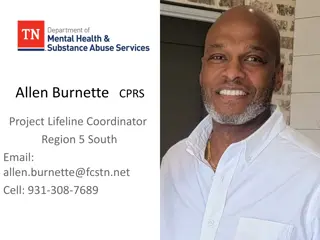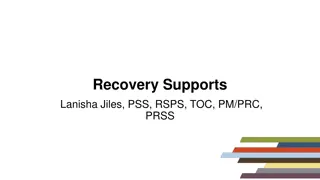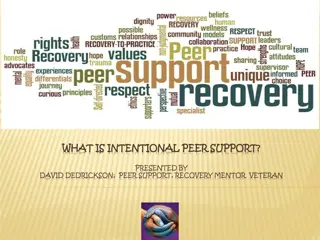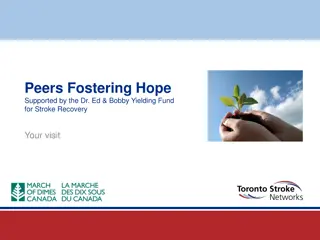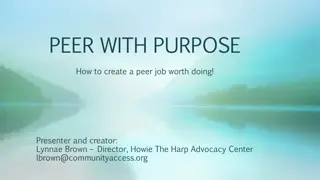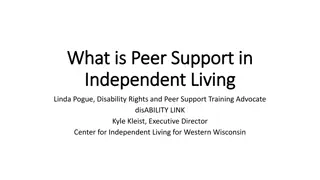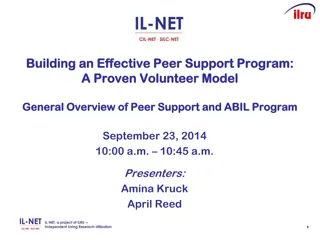Peer Support Training for Stroke Recovery: Fostering Hope & Learning
Explore the Peer Support Training program focusing on stroke recovery, providing hope, guidance, and emotional support to individuals and caregivers. Delve into the importance of peer support, objectives of the training, and the significance of fostering connections in the journey of stroke recovery.
Uploaded on Sep 19, 2024 | 0 Views
Download Presentation

Please find below an Image/Link to download the presentation.
The content on the website is provided AS IS for your information and personal use only. It may not be sold, licensed, or shared on other websites without obtaining consent from the author. Download presentation by click this link. If you encounter any issues during the download, it is possible that the publisher has removed the file from their server.
E N D
Presentation Transcript
Peers Fostering Hope Supported by the Dr. Ed & Bobby Yielding Fund for Stroke Recovery Learning about peer support
Intentions for today Get to know each other Deepen understanding of the purpose of the training Provide clarity around peer visitation Discuss the characteristics of an effective peer Clarify your roles & responsibilities as peers Review the March of Dimes and organization application process
Ground Rules R Responsible for learning O Open to different ideas P Participation E Experimenting with thoughts, applying what you learn S Sensitivity to all - civil, respectful, confidentiality
Introductions Share your name and one thing that you have accomplished since your stroke that you are most proud of? If you are a caregiver, share your name and one thing you are most proud of in your role as a caregiver.
What is Peers Fostering Hope? One to one, in-person hospital visitation program. Peers are caregivers and persons with stroke who are well into their recovery and are trained in visiting those who have just had a stroke and their caregivers while they are still resident in hospital. Peer support will help with recovery by providing hope, encouragement, and emotional support
Why Peer Support It addresses an important part of health care that we know is often missing or not addressed as well as it could be Through interviews, persons with stroke told us: They would like peer support earlier in their recovery process They want to feel a sense of hope They need help navigating the healthcare system
Objectives of this training Clarify your role, responsibilities and boundaries Inform you on the processes of the peer visiting in a hospital setting Enhance your awareness, confidence and skills in communicating and supporting persons with stroke and caregivers Increase your knowledge and understanding of different types and aspects of stroke Enrich your personal development in peer support.
Topics covered Learning about peer support How to make the most of your visit Stroke and its effects: Physical Cognitive Communication Emotional Effective conversations Ending the visit Re-engaging into the community
Your hopes for the training Pair or trio conversations Given the objectives of the training, what are your greatest hopes for this training?
What is Peer Support? LISTENING to a person s feelings and needs following a stroke Providing emotional support Sharing knowledge, experiences and hopes
Purpose of peer visiting Helps bridge the gap between hospital and community life Provides a sense of hope and possibility Hope is best delivered by listening
Goals of Peer Support To exchange ideas and coping strategies To share experiences and information To give and receive emotional support and a sense of hope To help people express feelings and know their feelings are normal
Goals of Peer Support To help people understand how they can adjust after a stroke To help people realize they are not alone To show, by example, that life is worth living To show a path to recovery and reconnecting with family and community
Characteristics of an effective peer What are the most important qualities of being a good peer?
Characteristics of a Peer Acknowledges LISTENS Provides hope and optimism Enables self-expression and awareness Supports Reassures Inspires Respects privacy, wishes, values, rights & beliefs Knows the balance between helping self and others
Your role as a peer What do you see your role as a peer being?
Your role as a peer Provide hope, inspiration and optimism. Help build trust, openness and empathy. Accept people as they are. Respect their privacy, wishes, values, rights and beliefs Listen, clarify and help identify choices for making decisions. Encourage others to express their feelings. Be patient and understanding.
Your role as a peer Gives reassurance and encouragement for positive actions. Be attentive, caring and sensitive to the feelings of others. Be dependable. Keep information confidential. Realize that not all problems can be fixed and not all people want to be helped. Know the balance between helping self and others and is continuously learning to be increasingly self-aware.
Confidentiality & Non-disclosure You must agree to maintain confidentiality What to do when someone may be suicidal? What do you do when you suspect abuse (be it physical, emotional, financial)?
Your experience with peer support Hearing a few stories - Tell us about a time when someone supported you in your recovery/caregiving journey, that truly made a positive difference for you. What specifically did they do that made the most difference? What difference did it make?
Closing What is your greatest strength that you bring to the role of peer? AND/OR What are you most looking forward to about the peers fostering hope training?
